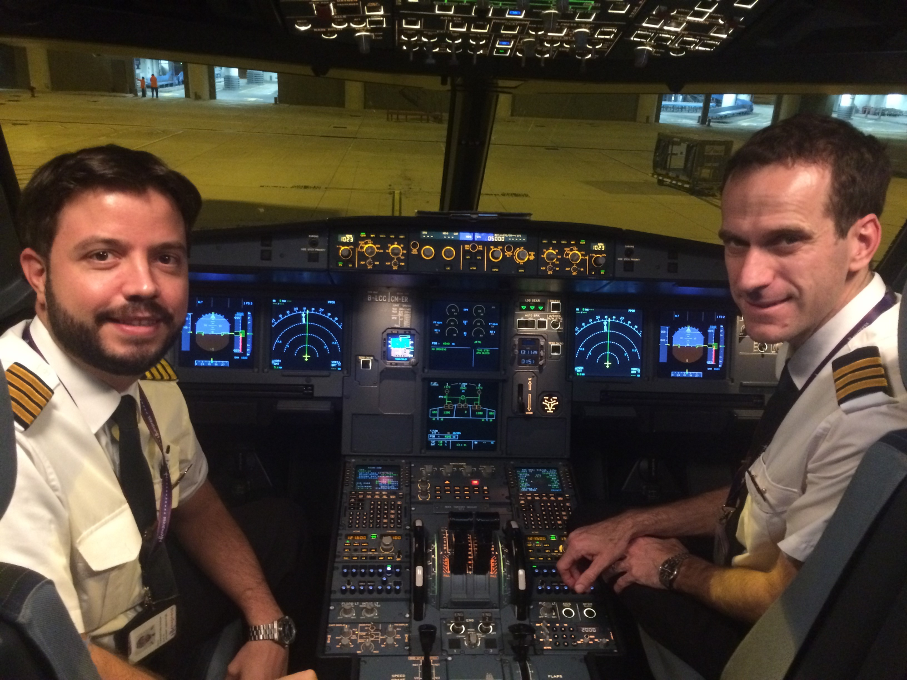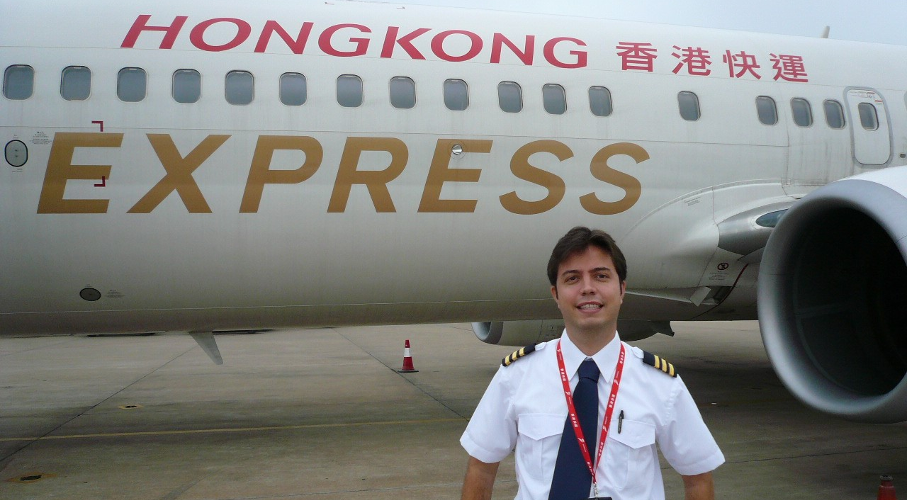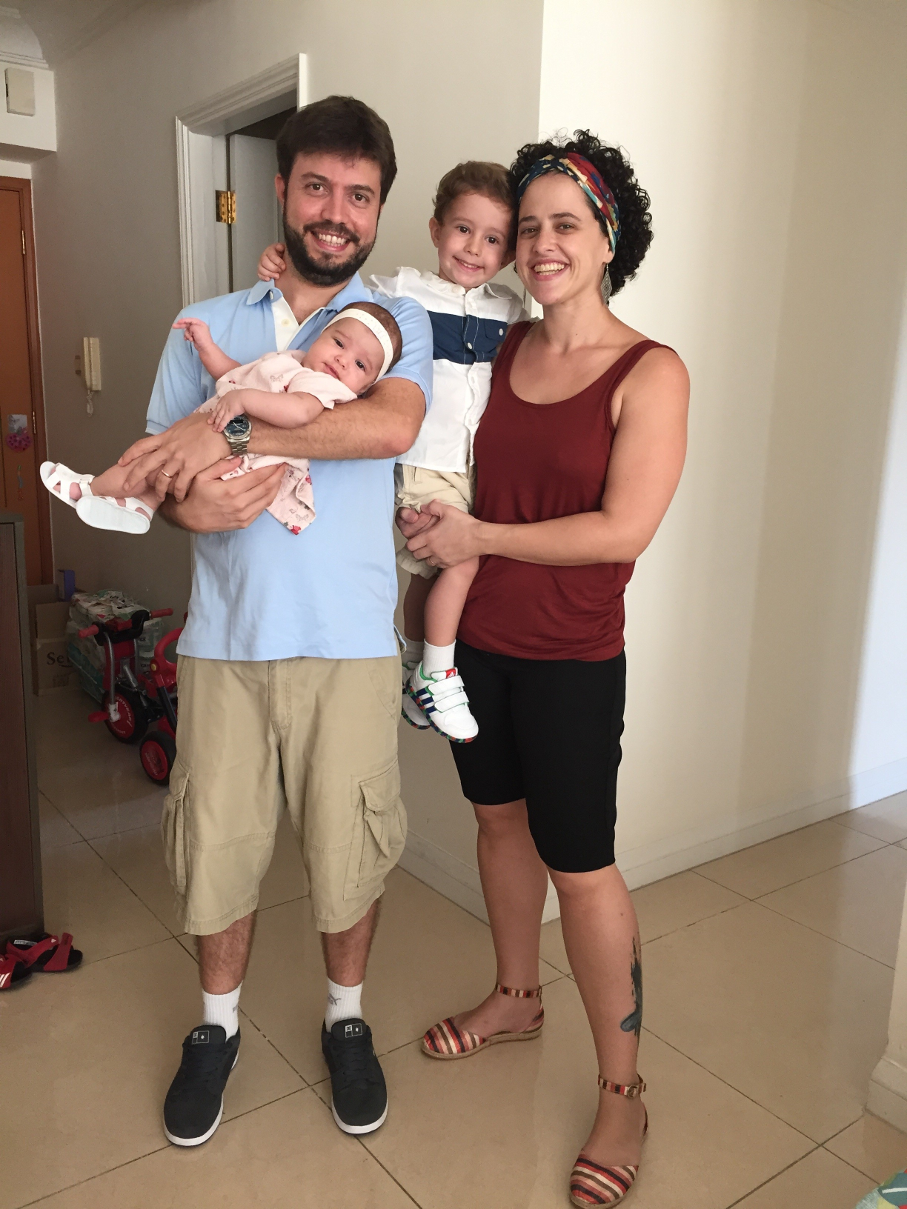Fábio Tomazini, an Aeronautical Sciences major, is now serving as a commander at HK Express
 An airplane enthusiast, Fábio Tomazini grew up listening to the stories of Tonico, his maternal grandfather, as a single engine aircraft pilot in the Central West of Brazil. Despite that, he had never thought about being a pilot until he was in High School when he heard about the Aeronautical Sciences program of PUCRS through a student’s handbook. That was how the he became interested in this area. Today, at the age of 35, he is an Airbus A320 commander for Chinese company HK Express, where he has been working for almost 10 years.
An airplane enthusiast, Fábio Tomazini grew up listening to the stories of Tonico, his maternal grandfather, as a single engine aircraft pilot in the Central West of Brazil. Despite that, he had never thought about being a pilot until he was in High School when he heard about the Aeronautical Sciences program of PUCRS through a student’s handbook. That was how the he became interested in this area. Today, at the age of 35, he is an Airbus A320 commander for Chinese company HK Express, where he has been working for almost 10 years.
Tomazini, a graduate from the Aeronautical Sciences program’s class of 2005, got his first job six months after he finished his degree, in an air taxi company based in Campo Grande (MS). “I flew a Bandeirante turboprop as a co-pilot. After almost two years, I moved to Hong Kong”, says he.
When he learned from a former PUCRS classmate that a Chinese company was hiring, he headed to Hong Kong and got the job. Tomazini joined HK Express in January 2008 as a co-pilot on a Boeing 737. After the company implemented a new business model, he was in charge of flying Airbus A320. Then, in 2014, he was promoted to commander.
Changing jobs and moving countries was a shocking experience because he had to deal with different instruments in a different country and in a foreign language: English. “The support from the company and from his colleagues made this transition smoother”, claims he. The transition from flying a turboprop in Brazil to flying a Boeing 373 overseas was a major step in his professional career. “The technical and human skills I gained as an undergraduate student were key factors in getting this job, since I was a rather unexperienced pilot”, recognizes he.
International Experience
 Commercial aviation overseas is such a standardized industry and works the same way both in Hong Kong and in Brazil. There are non operational differences, which include the administrative aspects and employer relationships. International aircraft companies usually require some previous experience from their employees. That is why it is common for pilots to gain this practical knowledge in Brazil before applying for a position overseas. Fluency in English is mandatory.
Commercial aviation overseas is such a standardized industry and works the same way both in Hong Kong and in Brazil. There are non operational differences, which include the administrative aspects and employer relationships. International aircraft companies usually require some previous experience from their employees. That is why it is common for pilots to gain this practical knowledge in Brazil before applying for a position overseas. Fluency in English is mandatory.
If someone wishes to have an international career in aviation, he suggests that dedication to studies and persistence are of utmost importance. “There are several steps to be taken in the aviation industry. Take them one step at a time”, warns he.
Tomazini has flown intensively in and out of China to countries such as Japan, South Korea, Taiwan, Cambodia, Thailand, Vietnam, Philippines, Myanmar, Mariana Islands and Micronesia. Despite flying to so many different destinations, he does not have jet lags when he flies on business because he crosses no more than 2 time zones, and this does not have any influence on his circadian rhythm. He only has problems when he flies to Brazil. As part of his preparation for returning, he takes two days off before resuming his activities.
Life in Hong Kong
 The challenge of having his first job in an international airline, aligned to a better perspective of professional growth and financial return, propelled Tomazini to have a different life in Hong Kong. “It was very hard because I was single and did not have my family around. The support I received from my wife after I got married was fundamental”, says he. He has been married to a Brazilian girl named Juliana for nine years, and has two kids: Henrique, 4, and Helena, 2. “We met when I was a co-pilot in Campo Grande. She also worked as an air taxi pilot”, tells he.
The challenge of having his first job in an international airline, aligned to a better perspective of professional growth and financial return, propelled Tomazini to have a different life in Hong Kong. “It was very hard because I was single and did not have my family around. The support I received from my wife after I got married was fundamental”, says he. He has been married to a Brazilian girl named Juliana for nine years, and has two kids: Henrique, 4, and Helena, 2. “We met when I was a co-pilot in Campo Grande. She also worked as an air taxi pilot”, tells he.
Hong Kong is a special administrative area of China. As an autonomous territory, the British colonial influence is very vivid. “Although the Chinese culture supersedes, it blends with a large number of nationals from all over the world, which give the city a more Western look. This soothes the differences and makes life easier”, reveals he. Cantonese and English are the official languages. “Only English is enough here”, claims he.
Living and working outside of Brazil requires that you have flexibility and an open mind to adapt and accept a different culture. The family has embraced the local habits, especially the festivities, such as the Chinese New Year, but they try to keep the Brazilian culture inside home as much as they can. “Cooking Brazilian food is a habit we sought to keep. We eat rice and beans pretty much every day. We want out kids to have a cultural identity”, reflects he.
The geographical distance and the time zone do not keep Tomazini and his family from flying to Brazil as they constantly come to enjoy the country. “I usually come at every eight months, just for tourism. Sometimes I head back to Hong Kong before my family does because duty calls.